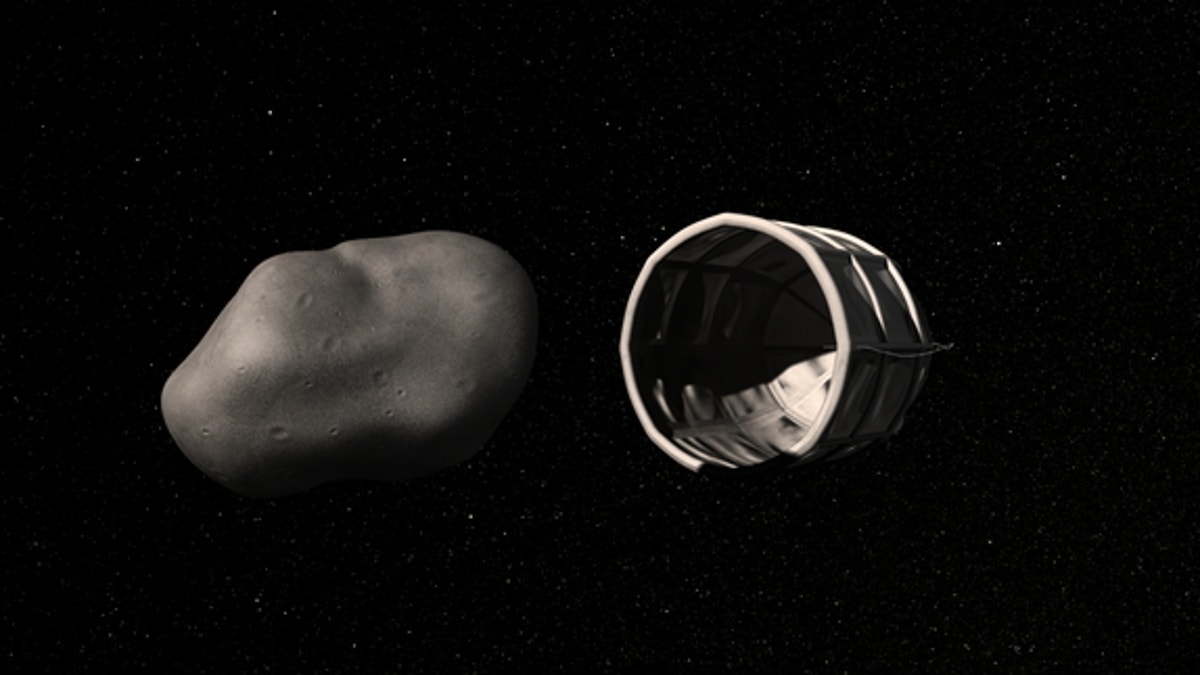
Small, water-rich near-Earth asteroids can be captured by spacecraft, allowing their resources to be extracted, officials with the new company Planetary Resources say. (Planetary Resources, Inc.)
PASADENA, Calif. – No U.S. president has waxed as poetically about mining the moon the way John F. Kennedy did about landing on it. But that didn't stop four entrepreneurs from making their best pitches Sept. 11 to two empty chairs.
Neither the Obama nor Romney campaigns had accepted invitations to discuss space policy here at the Space 2012 conference of the American Institute of Aeronautics and Astronautics. Their no-shows inspired Robert Wegeng, chief engineer at the Pacific Northwest National Laboratory in Washington, to pay tongue-in-cheek homage to Clint Eastwood's "invisible Obama" act at the recent Republican National Convention.
Wegeng set up two chairs and asked his space mining panelists to address both the invisible Obama and invisible Romney with ideas for mining water and minerals from the moon, Mars and asteroids.
"Mr. President, do you want a position in history as a leader of the free world, as a representative of a civilization and species that did not dwindle and fall under the burdens of technological advancement?" asked Jim Keravala, CEO of the Shackleton Energy Co.
[pullquote]
"You have the opportunity for historic recognition and votes."
The Shackleton Energy Co., founded in Del Valle, Texas, has worked on technologies needed to mine water ice from the moon and set up refueling stations both on the lunar surface and in Earth orbit. It was one of four U.S. companies represented on the AIAA panel.
Keravala told the absent U.S. president that he could set a leadership example by helping to commercialize space — something that would lead to political benefits for the president (or the presidential challenger) as well as help establish a self-sustaining space industry that could pay "millions, billions" in taxes. [50 Years of Presidential Space Visions]
Red Whittaker, CEO and chief science officer of Astrobotic Technology Inc. of Pittsburgh, exhorted Obama to take note of the "little robotic landing missions in the pipeline" that could lead to mining water ice on the moon.
Astrobotic Technology plans to launch a prospecting mission to drill for lunar ice in 2015 as part of its effort to win the $30 million Google Lunar X Prize.
"There are a lot of things that you could bet on for near-time success and fulfillment," Whittaker said. "One part of your heritage might be to drill for ice at the pole and lead the world in that regard."
Bob Richards, CEO of Moon Express Inc., "speaking as a true Canadian," joked that Romney appeared to be from Mars and Obama from Venus. But Richards made a serious request for the president to support space entrepreneurs and the commercial space industry.
Moon Express, based in Mountain View, Calif., is another Google Lunar X Prize competitor. Both Moon Express and Astrobotic Technology have won NASA contracts worth millions of dollars to carry out lunar data-collecting missions during their landing or prospecting missions.
Chris Lewicki, president and chief engineer of Planetary Resources Inc. in Bellevue, Wash., raised the question of whether human explorers should go to the asteroids, moon or Mars next. His answer: "All three."
Planetary Resources made headlines in April with an ambitious plan to mine the mineral wealth of asteroids — a venture backed by Hollywood filmmaker James Cameron and billionaire investors such as Google co-founder Larry Page.
Still, Lewicki recalled the U.S. government's legacy through NASA of "blazing a trail" and creating technologies and know-how that can be leveraged by others in the space agency's wake.
"It's important for us to have capability to do it, not because we're headed to any particular destination," Lewicki said. "That legacy is where government can and has led and can lead again."



















